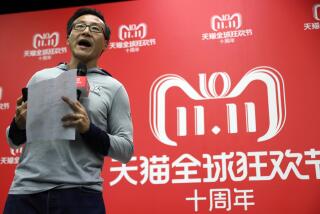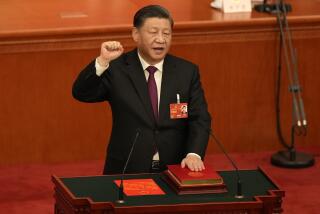Will China’s Next Leaders Be Puppets of the Old Guard?
- Share via
Chinese Vice President Hu Jintao’s visit to the United States this week, his first, has put the spotlight on the coming Chinese leadership transition. But will the changeover be a true transfer of power?
Most analysts believe that Hu, whom Deng Xiaoping selected as the core of the fourth-generation leadership, will take over Jiang Zemin’s positions as general secretary of the Communist Party this fall and as president of China in 2003.
But regardless of which younger leaders are selected for membership in the Politburo Standing Committee, the inner circle in Chinese politics, and for top government offices, the real question is whether Hu and the fourth-generation leaders will be given the authority to govern China. If third-generation leaders Jiang, Li Peng and Zhu Rongji try to run China from retirement, prospects for genuine political reform in China will decrease dramatically.
In an authoritarian system, top leaders are able to bend political institutions to their will and wield power with few restraints. Strong political institutions that can resist such influence enhance prospects for genuine political reform.
When Deng returned to power for the third time in the late 1970s, he tried to increase political stability in China by institutionalizing the political system and the leadership succession process. Key measures included mandatory retirement ages, term limits and efforts to groom future leaders by appointing promising young cadres to key party and state positions.
Deng’s reluctance to completely exit the political arena derailed this process. When serious policy differences emerged between Deng’s generation of revolutionaries and the younger, more bureaucratic leaders, Deng sacked the younger leaders. He undercut his goal of increasing the importance of political institutions over individuals. It was Deng and the retired octogenarian leaders who called the shots during the Tiananmen Square protests in 1989, not those who formally held party and state positions.
Will history repeat itself and stall political institutionalization? Three scenarios are likely for the leadership transition.
In the first, Jiang, Li and Zhu would retire, allowing Hu and the fourth generation of leaders to exercise real power. This would strengthen Chinese political institutions and the rule of law by bestowing political authority by virtue of institutional position rather than individual power.
Under this scenario, it is possible--though by no means guaranteed--that Hu might undertake the political reforms third-generation leaders discussed but never implemented.
In the second scenario, Jiang and Li would try to place proteges in positions of power to maintain their political influence after retirement. Jiang has been trying unsuccessfully for the last two years to place his confidant Zeng Qinghong in a more senior position to balance and constrain Hu. Here, the third generation would continue to play an active political role by manipulating the balance of power among fourth-generation leaders.
In the third scenario, Jiang would retire from his party and government positions but remain chairman of the Central Military Commission, the ultimate guarantor of Communist Party power in China. The backing of the army would give Jiang the power base to intervene in a range of political issues.
The scenario that materializes will have a significant influence on China’s political development. If Jiang attempts to hold on to his formal positions or to wield power informally after retirement, Li and Zhu probably will follow suit. This would undercut the fourth-generation leaders, weaken political institutions and damage prospects for significant reforms.
The most significant achievement of China’s third generation of leaders has been to maintain political stability and continue the economic reforms that have produced rapid growth and rising living standards. At this stage, however, the most important contribution they could make toward China’s future would be to strengthen the nation’s political institutions by giving up power gracefully.
More to Read
Sign up for Essential California
The most important California stories and recommendations in your inbox every morning.
You may occasionally receive promotional content from the Los Angeles Times.













